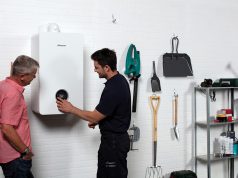
Just like any other device with moving parts, home appliances face continuous wear over the course of their functional lives.
At some point, the wear and tear of constant use can take its toll, causing your appliances to break down and fail. While appliance repairs can bring broken appliances back to life, regular issues are usually a reliable signal that an appliance is nearing the end of its life.
This is especially the case if the property is rented to multiple occupants over a certain period of time,” comments Ruban Selvanayagam of auction group Property Solvers.
So, how often should you replace your home appliances? Below, we’ve listed four of the most common kitchen and bathroom appliances, along with information on the average lifespan to expect from each item.
Oven/Stove
On average, a high quality oven, stove or range should last for about 15 years before it starts to become unreliable. If you have a higher-end oven, stove or range, it might keep working for 20+ years before reliability issues start to become apparent.
The specific lifespan of your oven depends on several factors. Generally, the more you use your stove, the more wear it will take, shortening its lifespan. Lower-end electrical ovens also tend to be more likely to fail due to wiring faults.
As for the age-old gas vs. electric debate, most consumer data shows that home users prefer electric ranges over gas due to their speed and high-heat performance.
Dishwasher
Most of the time, you should expect eight to 10 years of dependable use from your dishwasher before issues such as uneven water flow, water pooling and ineffective cleaning start to become obvious.
While dishwasher problems are fairly common, most are easily fixable. It’s also good to know that dishwashers tend to be more affordable than other common kitchen appliances, meaning you’ll spend less for a replacement than you would for a fridge, oven or washing machine.
Refrigerator
Just bought a new refrigerator? Because refrigerators contain fewer moving parts than many other kitchen appliances, they tend to have the longest lifespans, with data from reviews and consumer product ratings websites generally indicating a 15+ year average lifespan.
Rather than breaking down, fridges typically become less cost-effective over time. As newer, more energy-efficient models come out, keeping your old fridge becomes less cost-effective than switching it for a newer model.
Not ready to switch yet? If your fridge uses more electricity than you’d like, try making it more energy-efficient before considering a replacement.
Water Heater
Whether you use a tank or tankless water heater, you should expect to get about a decade of functional use from your house or apartment’s water heating system before you need to get a replacement.
If you have a tank heater, regular maintenance can increase its lifespan. Call in an expert at least once a year to flush sediment from the tank, check the valves and make sure it’s free of leaks to reduce your risk of dealing with a costly breakdown.
Not only does regular maintenance lower your risk of dealing with a leaking or damaged tank heater — it also means you’ll benefit from lower energy bills and faster hot water, especially in winter.













